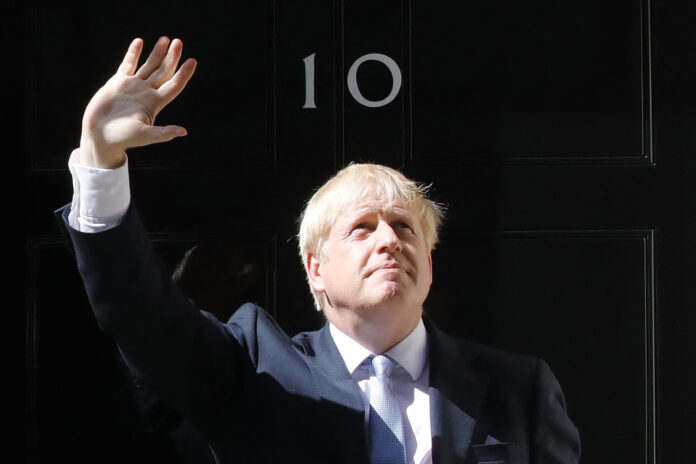British analysts agree that the internal censure motion against Boris Johnson may be “the beginning of the end of his term”, despite having won by a margin of 211 to 148 votes. “Boris is a walking dead man and he cannot survive this for long,” warns Matthew Parris in ‘The Times’, in line with other commentators on the conservative newspaper.
“Johnson is facing the political equivalent of driving down the M1 motorway with two flat tyres,” said former Foreign Secretary William Hague, the party’s voice of experience. “What is going to happen from now on? I guess Boris will carry on as if nothing had happened, but he faces a big problem: more than 40% of his deputies have voted against him, and that has happened without organization or conspiracy. It will be very difficult to continue as a leader in the long term.
“I would be surprised if Johnson were still prime minister in the fall,” Liverpool University professor Jon Tonge, considered the “wizard” of political science, who predicted the outcome with almost total accuracy, concludes bluntly in ‘The Guardian’ of Monday’s vote. “I would put the figure of six months on the table,” emphasizes Tonge. “Although everything depends in the end on how harshly he defends himself. We are facing the greatest escapist in politics. But the difficulty this time is that the committee that is investigating him in the House of Commons has to determine if he misled Parliament . And that can probably be his end point.”
The “premier” effectively faces a third investigation – after those carried out by senior official Sue Gray and by the police – to determine if he lied when he said on at least eight occasions before the House of Commons that the rules were not violated of the Covid in Downing Street.
The 126 fines imposed by the police -including one to Johnson himself for his birthday party, sanctioned with the equivalent of 118 euros- have questioned the “premier’s” statements, alleging that he always considered that the 15 investigated celebrations were “events of work”.
Even if Johnson provisionally manages to weather the storm triggered by the motion of censure, the parliamentary investigation may create unsustainable pressure on the “premier” and put his position in the pillory, even before the national conference of the Conservative Party in Birmingham in early October .
After 1,048 days in power, Johnson suffered a humiliation on Monday comparable to that of Margaret Thatcher in 1990 and Theresa May in 2018, forced to resign after being politically heavily damaged by two motions of no confidence. With the support of 59% of his deputies, compared to 41% who voted against, the big question is how long the “premier” in Downing Street will be able to withstand the growing siege of the rebel Tories.
The various factions of the party (Scottish MPs, the red wall, former supporters of remaining in the EU) allied themselves to far exceed the 100 insurgents of the total of 359, considered by analysts as the “premier” waterline for come out of the trance unscathed.
Johnson urged his ministers on Monday to “draw a line” under Partygate, put the scandal behind him and focus “on the issues that really matter to people in this country.” In his first council of ministers after the motion of censure, the conservative leader thanked the support of his cabinet, which closed ranks at the critical moment.
Johnson assured that Monday’s vote was “very important” because in his opinion it will serve “to leave behind the issues that our opponents are airing and focus exclusively on what we are doing to help the country move forward.” “That is what we are going to do,” stressed the conservative leader, who will make a cascade of political announcements in the coming days and is even considering the possibility of a mini-crisis to relaunch his government.
Technically, the “Tories” deputies cannot invoke a new motion of censure for another year. Several rebel parliamentarians, however, have indicated their intention to “change the rules” in order to force a new vote without waiting for “grace time”.
The swords are therefore still high, despite the efforts of the head of Justice, Dominic Raab, to ask his co-religionists for the result of 211 to 148 votes, described by himself as “a decisive victory.” “If we look at our agenda, there are many things that unite us, and that has always been the way the Conservative Party works,” added Raab, who highlighted the different situations of Johnson and May: “In 2019 we won the most wide in 40 years whereas with Theresa May we had a ‘hung’ Parliament”.
Raab served as Johnson’s squire on his return to the political arena after Monday’s setback. The “premier” also leaned on his old ally of the Brexit campaign, Michael Gove, to relaunch “a great change agenda” in the United Kingdom, after the double impact of Partygate and galloping inflation of 9%.
Johnson stressed the need to “cut costs” of the Government, department by department, and ensure that “money is spent and invested in a prudent way.” The “premier” warned that this is the same dilemma faced by companies and families in the midst of the cost of living crisis, the problem that most worries the British today.
Conforms to The Trust Project criteria








